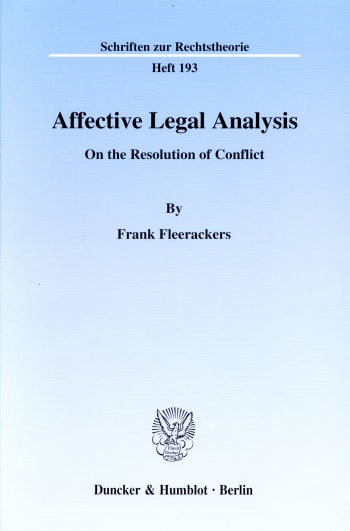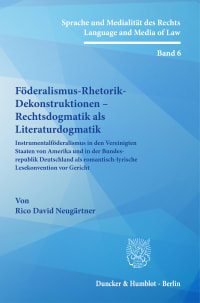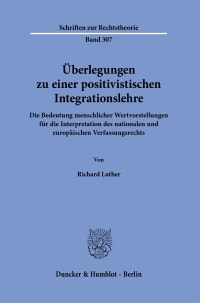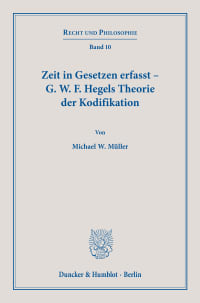On the Resolution of Conflict
Beschreibung
Indeed, if the legal field is to be understood as instrumental to democracy's cohabitation of individuals, research on dispute resolution remains pre-eminent as a means to understand how individual views differ and how different views can be overcome. As a central part of conflict analysis, such research would assist an interdisciplinary quest for a dynamic understanding of democracy and law. It would focus on how different individuals with different conceptions of the good can live together in their community, in their world. Scientific research in the fields of communication, economics, psychology, history, political theory and philosophy, to name but a few, would side with legal theory in a shared ambition to analyze the way individuals are affected by their views as well as by their institutions, in order to provide society with a dynamic means to solve conflicts and enhance citizenship or legal awareness. Such research necessarily coincides with empathy-oriented education, directed towards an understanding of different conflict positions and the related comprehensive or non-comprehensive views affecting them. An affective education, analyzing all affective mechanisms of societal or interpersonal disputes and their legal or alternative resolution. A clinical education, offering an interactive simulation with regard to these positions and their affective impact, demonstrating how individual views continuously affect the positions taken, how disputes are affected by the legal or other institutions that attempt to solve them, and how the effectiveness of legal or other solutions to the conflict at hand depends on a practice of affective legal analysis. Thus legal and civic education, by way of affective narration and clinical simulation, join affective legal analysis in its endeavor to provide society with a similarly affective and non-rationalizing approach of legal awareness.
Inhaltsübersicht
Inhaltsübersicht: Prologue - Chapter 1: The Conveyance of Legal Awareness: Legal Awareness - Juridification and Legal Discourse - The Effectiveness of Law and Affective Legal Analysis - Civic Education: Authoritative, yet Alternatives-based - Affective Legal Analysis and Rationalizing Legal Analysis - Affective Legal Analysis: The Quest for Legal Awareness - The Conveyance of Legal Awareness: A Preliminary Conclusion - Chapter 2: Political and Legal Theory on the Conveyance of Legal Awareness: Double Contingency and Difference - Altruism and Individualism - Communitarianism and Liberalism - Political Liberalism - Affective Institutional Analysis and Affective Legal Analysis - Civic Education and the Conveyance of Legal Awareness: A Conclusion - Chapter 3: Human Rights and Affective Legal Analysis: Human Rights, Individualism and Universality - Individualism and the Legal Image of Man - Individualism and Universality - Democracy and Human Rights - Human Rights and Human Life - Affective Legal Analysis and Contemporary Human Rights Discourse - Rawls's Law of Peoples - Rorty's Human Rights Culture - Human Rights and Affective Legal Analysis: A Conclusion - Chapter 4: Alternative Dispute Resolution and Affective Legal Analysis: Alternative Dispute Resolution and Affective Legal Analysis - Alternative Dispute Resolution: Syntax and Efficiency - Alternative Dispute Resolution: Ideology and the Affective Turn - Alternative Dispute Resolution and Rationalizing Legal Analysis - Game Theory and Alternative Dispute Resolution - ADR-Scholarship and Affective Legal Analysis: A Conclusion - Glossary of Terms - Bibliography - Index
Bücher aus denselben Fachgebieten
Kontakt
-
+49 30 / 79 00 06 - 0
-
Bestellinformation
-
Versandkostenfrei innerhalb Deutschlands.
-
Für Kunden aus EU-Ländern verstehen sich unsere Preise inklusive der gesetzlichen Mehrwertsteuer und – außer bei digitalen Publikationen – zuzüglich Versandkosten. Für Kunden aus Nicht-EU-Ländern verstehen sich unsere Preise als mehrwertsteuerfrei und – außer bei digitalen Publikationen – zuzüglich Versandkosten.
-
-
Newsletter































